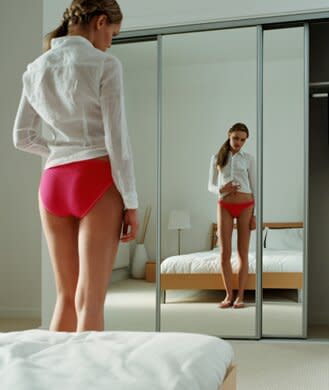The Scary Truth About "Thinspo"

Happily pinning away on Pinterest the other day, a picture of a fabulous fit woman caught my eye. When I clicked on it however, I was anything but inspired. Text across her stomach offered a prescription for purging, and the site it linked to? Ana4Ever, as in "anorexic forever." It was thinspo. For people who have never suffered from an eating disorder (like I have) or been through treatment for it (twice!), it may be hard to understand why "thinspiration" images like these are so devastating, but the effect is very real.
Thinspo turns an illness into a lifestyle choice, says Lynn S. Grefe, MA, president and chief executive officer of the National Eating Disorders Association. "These sites are very, very dangerous. Eating disorders are biologically based, psychiatric illnesses, and these sites promote being sick and staying sick... bottom line, they delay treatment."
Thinspo-heavy on the thin, light on the inspiration-has been around since the inception of the Internet, and women suffering from everything from poor body image to a full-blown eating disorder have used the images to punish, cajole, shame, and guilt themselves into losing weight.
In honor of National Eating Disorder Awareness week (2/26-3/2), we looked back over the past couple of decades to find out what-if anything-has changed. What did we learn? There's good and bad news.
The bad: The media, replete with pictures of pin-thin starlets and catwalk models, keeps a steady supply of unrealistic and unattainable pictures coming. But the good news is that now, more than ever before, people are fighting back against these ideals. In fact, Tumblr (the thinspo haven) recently announced a new policy that bans any blog promoting self-harming behaviors, including all sites dedicated to the glorification of eating disorders. Of course as long as there are women dying-literally-to be thin, there will still be thinspiration sites on the Internet, but at least now they'll be harder to find.
Making a public policy change, like Tumblr did, is a huge step forward when it comes to a media outlet taking responsibility for the messages they are propagating. Now, if only we could get other media outlets to agree. In France it's now illegal to publish anything that could be seen as an "incitement to anorexia." But here in the United States, it's still considered free speech, and YouTube channels are already filling the void left by Tumblr.
What can you do to help? Make deliberate choices to promote healthy body ideals both in yourself and in others. For a great first step, check out our slideshow of truly healthy, inspirational images. They're guaranteed to get you moving, lifting, and laughing.
